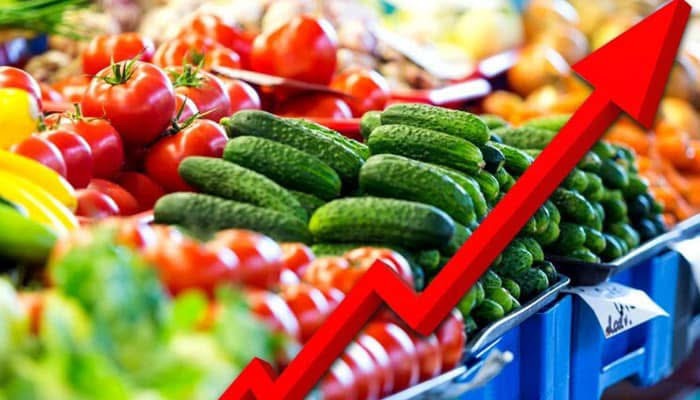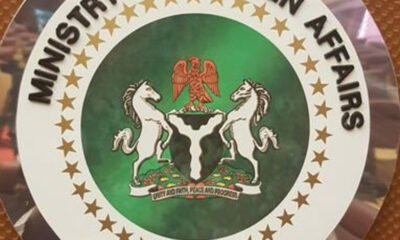Business
Food inflation hits 40% despite FG $3.3bn agric loan
Published
4 months agoon
By
Ekwutos Blog
Despite securing multilateral loans amounting to $3.334bn (N5.178tn) and attracting over $4.3bn investments to boost food production, the cost of essential staple food items skyrocketed by 60.88 per cent under the leadership of President Bola Tinubu, The PUNCH reports.
When Tinubu assumed office in May 2023, food inflation was 24.82 per cent. It jumped to about 40 per cent in November 2024. This is based on data from the National Bureau of Statistics.
This is occurring as Nigerians are increasingly struggling to afford basic food items, with many households finding it difficult to make ends meet due to the sharp rise in prices.
This stark increase in food prices stands in contrast to the government’s ambitious efforts to address food security and agricultural development, raising concerns about the effectiveness of current economic policies, the impact of inflation, and the challenges in translating financial support into tangible relief for Nigerians.
Explainer: Guidelines To Actualise Guinness World Record Dream | Punch
Upon assumption of office in May last year, President Tinubu promised to prioritise food availability and security, stressing that the government would cultivate about 500,000 hectares of farmlands to combat hunger in the country.
“I am well aware that for some time now, the conversations and debates have centred on the rising cost of living, high inflation, which is now above 28 per cent, and the unacceptable high under-employment rate.
“To ensure constant food supply, security, and affordability, we will step up our plan to cultivate 500,000 hectares of farmlands across the country to grow maize, rice, wheat, millet, and other staple crops”, Tinubu stated in his new year address amidst other commitments.
However, the spiral increase in transportation costs occasioned by the removal of fuel subsidies, massive devaluation of the naira, and ravaging insecurity have fuelled a rapid increase in the price of all food commodities over 19 months.
Data obtained from the Consumer Price Index report released by the National Bureau of Statistics between May 2023, when Tinubu assumed office, and November 2024 showed that for 14 consecutive months, Nigerians spent increasingly more money each time they visited the market to buy food items.
A breakdown showed that food inflation increased from 24.82 per cent in May 2023 to 25.25 per cent in June, 26.98 per cent in July, 29.34 per cent in August, 30.64 per cent in September, 31.52 per cent in October, 32.84 per cent in November and 33.93 in December 2023.
By January 2024, the price of food items increased to 35.41 per cent and surged further to 37.92 per cent in February, 40.01 per cent in March, 40.53 per cent in April, 40.66 per cent in May, 40.87 in June, before witnessing a drop to 39.53 per cent in July and 37.52 per cent in August due to the harvest season.
In September, the cost of food increased again to 37.77 per cent, 39.16 per cent in October, and 39.93 per cent in November, which is almost 40 per cent.
Despite the challenging situation, checks by our correspondent revealed that the government secured loans totalling $3.334bn, an equivalent of N5.178tn from the World Bank and the African Development Bank under President Tinubu’s administration to enhance agricultural production, adopt innovative farming techniques, and increase food sufficiency for Nigerians.
Analysis showed that $500m was approved by the World Bank for the Livestock Productivity and Resilience Support Project to boost livestock production and food security nationwide.
The Board of the World Bank Group approved a $500m loan to Nigeria last week Friday (December 13, 2024) to boost rural access and agricultural marketing in the country.
According to information obtained from the Washington-based institution, the loan is for the Rural Access and Agricultural Marketing Project—Scale Up.
It is designed to bridge the gap between rural communities and the broader marketplace, facilitating smoother access to agricultural markets, schools, and hospitals and promoting social cohesion among rural populations.
Similarly, the AfDB under the leadership of President Akinwumi Adesina has approved a loan facility worth $2.2bn in capital mobilisation for its transformative Special Agro-Industrial Processing Zones in Nigeria.
He said phase two is set to revolutionize Nigeria’s agricultural sector by creating agro-industrial hubs that drive productivity, enhance food security, raise living standards, and create jobs.
The programme will be implemented in states including Cross River, Imo, Ogun, Oyo, Kaduna, Kwara, Kano, and the Federal Capital Territory and will expand to an additional 24 States in Nigeria in the next three years.
In an interview with PUNCH, Adeshina said its agricultural initiatives would yield about five million metric tons of wheat, rice, cassava, and this year for the country.
Also, a loan of $134m was approved for seeds and grain production in the country in November this year.
A statement by the agriculture ministry said the fund will support farmers across the country to increase production of key staple crops, thereby improving national food security.
Health 360: Sickle Cell Disease
Upon assumption of office in May last year, President Tinubu promised to prioritise food availability and security, stressing that the government would cultivate about 500,000 hectares of farmlands to combat hunger in the country.
“I am well aware that for some time now, the conversations and debates have centred on the rising cost of living, high inflation, which is now above 28 per cent, and the unacceptable high under-employment rate.
“To ensure constant food supply, security, and affordability, we will step up our plan to cultivate 500,000 hectares of farmlands across the country to grow maize, rice, wheat, millet, and other staple crops”, Tinubu stated in his new year address amidst other commitments.
However, the spiral increase in transportation costs occasioned by the removal of fuel subsidies, massive devaluation of the naira, and ravaging insecurity have fuelled a rapid increase in the price of all food commodities over 19 months.
Data obtained from the Consumer Price Index report released by the National Bureau of Statistics between May 2023, when Tinubu assumed office, and November 2024 showed that for 14 consecutive months, Nigerians spent increasingly more money each time they visited the market to buy food items.
A breakdown showed that food inflation increased from 24.82 per cent in May 2023 to 25.25 per cent in June, 26.98 per cent in July, 29.34 per cent in August, 30.64 per cent in September, 31.52 per cent in October, 32.84 per cent in November and 33.93 in December 2023.
By January 2024, the price of food items increased to 35.41 per cent and surged further to 37.92 per cent in February, 40.01 per cent in March, 40.53 per cent in April, 40.66 per cent in May, 40.87 in June, before witnessing a drop to 39.53 per cent in July and 37.52 per cent in August due to the harvest season.
In September, the cost of food increased again to 37.77 per cent, 39.16 per cent in October, and 39.93 per cent in November, which is almost 40 per cent.
Despite the challenging situation, checks by our correspondent revealed that the government secured loans totalling $3.334bn, an equivalent of N5.178tn from the World Bank and the African Development Bank under President Tinubu’s administration to enhance agricultural production, adopt innovative farming techniques, and increase food sufficiency for Nigerians.
Analysis showed that $500m was approved by the World Bank for the Livestock Productivity and Resilience Support Project to boost livestock production and food security nationwide.
The Board of the World Bank Group approved a $500m loan to Nigeria last week Friday (December 13, 2024) to boost rural access and agricultural marketing in the country.
According to information obtained from the Washington-based institution, the loan is for the Rural Access and Agricultural Marketing Project—Scale Up.
It is designed to bridge the gap between rural communities and the broader marketplace, facilitating smoother access to agricultural markets, schools, and hospitals and promoting social cohesion among rural populations.
Similarly, the AfDB under the leadership of President Akinwumi Adesina has approved a loan facility worth $2.2bn in capital mobilisation for its transformative Special Agro-Industrial Processing Zones in Nigeria.
He said phase two is set to revolutionize Nigeria’s agricultural sector by creating agro-industrial hubs that drive productivity, enhance food security, raise living standards, and create jobs.
The programme will be implemented in states including Cross River, Imo, Ogun, Oyo, Kaduna, Kwara, Kano, and the Federal Capital Territory and will expand to an additional 24 States in Nigeria in the next three years.
In an interview with PUNCH, Adeshina said its agricultural initiatives would yield about five million metric tons of wheat, rice, cassava, and this year for the country.
Also, a loan of $134m was approved for seeds and grain production in the country in November this year.
A statement by the agriculture ministry said the fund will support farmers across the country to increase production of key staple crops, thereby improving national food security.
Related News
Food inflation: Imported rice price jumps by 114%
Food inflation: Seven imported wheat vessels arrive Nigeria
Stakeholders warn of higher food inflation in 2025
“The Federal Government has secured a loan facility of $134m from the African Development Bank to help farmers boost seeds and grain production in the country,” the statement read.
The government through the Ministry of Agriculture and Food Security also secured a private-sector investment commitment worth $4.3bn to advance private-sector development in fertiliser production, hybrid seed technology, and agricultural finance.
The partnership with the Fundação Getulio Vargas of Brazil will support one agribusiness in Nigeria’s 774 Local Government Areas with technical and financial resources over the next five years.
The surge in food costs underscores the complexities of managing an economy where external financial assistance and investments have yet to stabilize the market or alleviate the burden on citizens.
Stakeholders wondered the effect of the loans which are to yield expected results and drive down the cost of food items.
You may like


Kano deputy gov reports back after peace-building mission in Edo


Despite criticism, Ibas swears in sole administrators for Rivers LGAs


FCT Minister rolls out major land administration reforms, introduces strict timelines for allottees


Atiku, El-Rufai, Tambuwal visit Buhari in Kaduna


APC Can’t Take Anambra Like Edo, Imo and Kogi— Gov Chukwuma Soludo


List of ambassadorial nominees not ready – Foreign Affairs Ministry
Business
AFDB REAFFIRMS $2.2 BILLION PLEDGE AS VP SHETTIMA COMMISSIONS 2ND SAPZ IN CROSS RIVER ** Says agro-industrial processing zones will empower farmers, attract investors, diversify Nigeria’s economy
Published
1 day agoon
April 10, 2025By
Ekwutos Blog
STATE HOUSE PRESS RELEASE
AFDB REAFFIRMS $2.2 BILLION PLEDGE AS VP SHETTIMA COMMISSIONS 2ND SAPZ IN CROSS RIVER
** Says agro-industrial processing zones will empower farmers, attract investors, diversify Nigeria’s economy
The federal government has commenced construction of the Special Agro-Industrial Processing Zone in Calabar, Cross River State, as part of a nationwide drive to transform the agricultural sector and stimulate inclusive economic growth across Nigeria.
This is the second of such a facility initiated within 72 hours after Vice President Kashim Shettima had on Tuesday performed the groundbreaking ceremony for the construction of the Kaduna State SAPZ in the Chikun local government area of the state.
Already, the AfDB_Group has reaffirmed its commitment to mobilising an additional $2.2 billion to execute the second phase of the SAPZ project across 28 states in Nigeria.
Speaking on Thursday when he performed the groundbreaking ceremony of SAPZ in Calabar, the Vice President described the project as “a game changer” that aligns with the President Tinubu administration’s Renewed Hope Agenda, aimed at diversifying the nation’s economy, addressing food security, tackling rural unemployment, as well as empowering farmers and the youth population.
“There is no intervention more practical in our dream of a nation where the potential of agriculture is maximised than what’s brought us together today. This isn’t just a project—it’s a bold vision to transform Nigeria’s agricultural value chain,” VP Shettima said.
According to him, the SAPZ initiative, supported with counterpart funding from development partners and the private sector, is designed to address challenges that have long hindered the growth of Nigeria’s agricultural economy, including inadequate processing infrastructure, limited access to markets, and rural unemployment.
“For far too long, our farmers have contended with poor infrastructure, lack of access to finance, and inadequate processing facilities. This zone is designed to confront those challenges head-on by creating an ecosystem where innovation, investment, and collaboration thrive,” he noted.
VP Shettima explained that the Calabar SAPZ will serve as a hub for agro-processing and storage, providing farmers and agripreneurs with critical infrastructure to scale their operations and tap into local and international markets.
“This is where farmers will meet with private investors, where ideas will turn into enterprise, and where our youth will find meaningful opportunities,” he said, disclosing that the Tinubu administration has classified SAPZ as a priority program in Nigeria’s quest for food security, with plans to institutionalize it as a government agency that will facilitate agricultural industrialization across all 36 states.
“These zones will generate thousands of jobs. They will create opportunities for young people, empower them with skills and knowledge to engage in meaningful work and help them contribute positively to the economy. Cross Riverians, development has come to your doorstep. For you and for the country, SAPZ is a game changer—one that will enable Nigeria to diversify its economy with a sustainable source.,” he stated.
Senator Shettima also expressed gratitude to key international development partners, including the African Development Bank, the Islamic Development Bank, and the International Fund for Agricultural Development, for their support and belief in Nigeria’s vision.
The Vice President commended Cross River State Governor, Senator Prince Bassey Edet Otu, for his collaboration, describing him as “a critical foundation for the success of this intervention and a great ally in development.”
Earlier, Cross River State Governor, Senator Otu, said the programme marked a watershed in the ongoing bid by his administration to establish the renewable resource base of the state through the full utilisation of agriculture and its multiple value chain.
Otu pointed out that in Cross River State, the establishment of a cluster of smallholder farmers in cash crops such as rice, cassava, millet, and cocoa across the state is the right step towards the agro-industrial revolution.
He said the paradigm shift from a non-renewable to a renewable resource base also holds the key to the prosperity of many nations, hence the imperative to join the league of sub-nationals in Nigeria that have adopted agriculture as the mainstay of their economy.
“The deliverables of the envisaged projects are food security, diversification of the state economy towards export-oriented trajectory and increase in the State’s GDP. When these projects are fully operational there is an expected robust collaboration with reputable agro-based processing institutes, universities and the rest, aimed at accelerating breakthroughs in many agro-industrial production.”
Also, Minister of Agriculture and Food Security, Senator Abubakar Kyari, said the programme would transform the agricultural production and agro-investment landscape in Nigeria under the Renewed Hope Agenda of President Tinubu.
Kyari thanked Vice President Shettima for his leadership and political backing at the highest level in the implementation of the SAPZ in Nigeria, just as he also commended the Governor of Cross River State for his commitment to ensuring that the state is among the front-running states that will commence the construction of their Agro-Industrial Processing Hub.
In his remark, President of AfDB, Dr Akinwumi Adesina, reiterated the bank’s pledge to mobilise $2.2 billion to execute the SAPZ project in 28 states across Nigeria.
Adesina observed that Cross River State has a significant role to play in Nigeria’s agricultural transformation because of the vast production of cocoa, cassava, rice and banana in the state, saying Obudu Cattle Ranch alone can turn the state into a huge livestock producer.
He also acknowledged that the state is ideal for SAPZ because it has an export processing zone, ports facility, and export handling capabilities, adding that the SAPZ in Calabar can easily be linked to the seaport for the transportation of processed agricultural commodities to the export market in neighbouring countries, including Cameroon and the rest.
“The African Development Bank, as you know, is spearheading this together with our partners, which include the Islamic Development Bank and the International Fund for Agricultural Development, and we have put together $934 million from the African Development Bank, with core financing of $938 million from these partners.
“The first phase of SAPZ in Nigeria will be in eight states of Cross River, Kaduna, Kano, Katsina, Oyo, Ogun, Kwara, Imo and the Federal Capital Territory. We are delighted with our partnership with the Islamic Development Bank and the International Fund for Agricultural Development.
“We have put together a financing package of $510 million to make this work. We expect, in the second phase of this, to mobilise $2.2 billion to be able to work for 28 states across the federation with several partners,” the AfDB President said.





Stanley Nkwocha
Senior Special Assistant to The President on Media & Communications
(Office of The Vice President)
10th April, 2025
Business
Tariff war could reduce US-China goods trade by 80% – WTO DG, Okonjo-Iweala
Published
2 days agoon
April 10, 2025By
Ekwutos Blog
The Director-General of the World Trade Organization, Ngozi Okonjo-Iweala has said the US-China tariff war could cut trade in goods between the two economic giants by 80 percent, pulling down the rest of the world economy.
Okonjo-Iweala said this in a statement on Wednesday.
Ekwutosblog reports that US President Donald Trump raised tariffs on China to 125 percent on Wednesday as the world’s two largest economies fought over retaliatory levies.
“The escalating trade tensions between the United States and China pose a significant risk of a sharp contraction in bilateral trade. Our preliminary projections suggest that merchandise trade between these two economies could decrease by as much as 80 percent,” she said.
According to her, the United States and China together accounted for three per cent of world trade and warned that the conflict could severely damage the global economic outlook.
Trump, even as he slapped further tariffs on China, paused higher tariffs on the rest of the world for 90 days after dozens of countries reached out for negotiations.
Okonjo-Iweala warned that the world economy risked breaking into two blocs, one centred around the United States and the other China.
“Of particular concern is the potential fragmentation of global trade along geopolitical lines. A division of the global economy into two blocs could lead to a long-term reduction in global real GDP by nearly seven percent,” she said.
She, therefore, urged all WTO members to address the challenge through cooperation and dialogue.
A few hours earlier, the US president ramped up duties on Chinese goods to 104 percent, only to hike them further when China retaliated by raising tariffs on US imports to 84 percent.
Trump, in a social media post announcing the moves, said China had been singled out for special treatment because of the lack of respect that China has shown to the World’s Markets.
Business
FCCPC Urges Nigerians to Report Harassing Loan Apps and Businesses
Published
5 days agoon
April 7, 2025By
Ekwutos Blog
The Federal Competition and Consumer Protection Commission (FCCPC) is advising Nigerians to report any loan apps or businesses that engage in harassing behavior over unpaid loans.
According to the FCCPC, no consumer should live in fear of harassment or intimidation.
Ekwutosblog gathered that Consumers can file complaints with the FCCPC through their website or contact their customer service hotline.
The FCCPC is responsible for protecting consumer rights and promoting fair competition in Nigeria.
FCCPC has taken steps to regulate digital money lenders and enforce consumer protection laws, including fining Meta and WhatsApp $220 million for violating the Federal Competition and Consumer Protection Act (FCCPA) and the Nigeria Data Protection Regulation (NDPR)
To file a complaint, follow these steps
Visit the FCCPC website and fill out the complaint form. Provide detailed information about the harassment, including dates, times, and communication records. Submit supporting documents, such as screenshots or messages. FCCPC Website: https://fccpc.gov.ng/ Customer Service Hotline: 0805 600 2020, 0805 600 3030
Email: mailto:contact@fccpc.gov.ng

500K deposit: Man who lost his pregnant wife responds after Reuben Abati, blasted him.

Kano deputy gov reports back after peace-building mission in Edo

Despite criticism, Ibas swears in sole administrators for Rivers LGAs
Trending

 Trending6 months ago
Trending6 months agoNYA demands release of ‘abducted’ Imo chairman, preaches good governance
- Business6 months ago
US court acquits Air Peace boss, slams Mayfield $4000 fine

 Politics6 months ago
Politics6 months agoMexico’s new president causes concern just weeks before the US elections
- Entertainment6 months ago
Bobrisky transferred from Immigration to FCID, spends night behind bars
- Entertainment6 months ago
Bobrisky falls ill in police custody, rushed to hospital

 Politics6 months ago
Politics6 months agoRussia bans imports of agro-products from Kazakhstan after refusal to join BRICS

 Politics6 months ago
Politics6 months agoPutin invites 20 world leaders
- Politics1 year ago
Nigerian Senate passes Bill seeking the establishment of the South East Development Commission.

